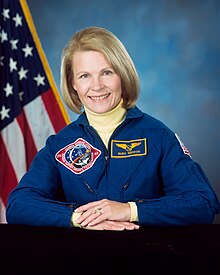M. Rhea Seddon
| Margaret Rhea Seddon | |
|---|---|
 |
|
| NASA Astronaut | |
| Nationality | American |
| Status | Retired |
| Born |
November 8, 1947 Murfreesboro, Tennessee |
|
Other occupation
|
Medical doctor |
|
Time in space
|
30d 02h 21m |
| Selection | 1978 NASA Group |
| Missions | STS-51-D, STS-40, STS-58 |
|
Mission insignia
|
|
Margaret Rhea Seddon (born November 8, 1947) is a physician and retired NASA astronaut. After being selected as part of the first group of astronauts to include women, she flew on three Space Shuttle flights: as mission specialist for STS-51-D and STS-40, and as payload commander for STS-58. Both before and after her career in the astronaut program, she has been active in the medical community in Tennessee, Mississippi and Texas.
Seddon was born in Murfreesboro, Tennessee, where she attended St Rose of Lima Catholic School and graduated from Central High School in 1965. She received a bachelor of arts degree in physiology from the University of California, Berkeley, in 1970, and a doctorate of medicine from the University of Tennessee College of Medicine in 1973. While at the University of California, Seddon was a member of Sigma Kappa sorority.
After medical school, Dr. Seddon completed a surgical internship and 3 years of a general surgery residency in Memphis with a particular interest in nutrition in surgery patients. Between the period of her internship and residency, she served as an Emergency Department physician at a number of hospitals in Mississippi and Tennessee, and served in this capacity in the Houston area in her spare time. Dr. Seddon has also performed clinical research into the effects of radiation therapy on nutrition in cancer patients.
Selected as an astronaut candidate by NASA in January 1978, Dr. Seddon became an astronaut in August 1979. Her work at NASA was in a variety of areas, including Orbiter and payload software, Space Shuttle Avionics Integration Laboratory, Flight Data File, Shuttle medical kit and checklist, launch and landing rescue helicopter physician, support crew member for STS-6, crew equipment, membership on NASA's Aerospace Medical Advisory Committee, Technical Assistant to the Director of Flight Crew Operations, and Capsule Communicator (CAPCOM) in the Mission Control Center.
...
Wikipedia
